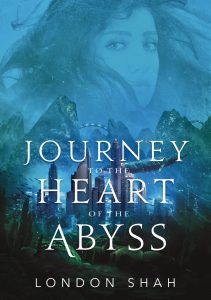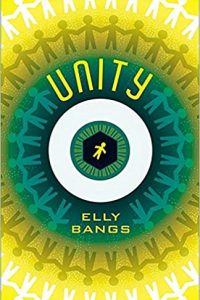Alex Brown Reviews Journey to the Heart of the Abyss by London Shah
 Journey to the Heart of the Abyss, London Shah (Little, Brown 978-0-75955-507-5, $18.99, 384pp, hc) November 2021.
Journey to the Heart of the Abyss, London Shah (Little, Brown 978-0-75955-507-5, $18.99, 384pp, hc) November 2021.
Journey to the Heart of the Abyss, the second book in London Shah’s Light the Abyss duology, begins 80 years in the future, when the world is covered in water. In the mid-21st century, an asteroid slammed into the planet, turning the surface into a toxic morass of violent storms, and drowning the world in seawater. Humans built cities to withstand the rising oceans and looked back to the past with dreamy nostalgia, but before disaster struck, a group of scientists did the unthinkable: genetically engineer humans to be able to breathe underwater. Dubbed Homo amphibious, these people were originally intended to be physically strong yet docile laborers (more like enslaved people) whose sole purpose was to do the grunt work to keep Homo sapiens alive. When they broke free of their chains, humans accused them of being monsters, savages, terrorists. As the amphis tried to create their own communities free from human tyranny, the humans set out to destroy them by any means necessary.
Leyla McQueen is a British-Pashtun Muslim teenager with a knack for racing submersibles. After her father is arrested on trumped up charges, she decides her best bet is to win the London Submersible Marathon and use her victory to ask the prime minister to secure her father’s release. That race changes Leyla’s life in more ways than one. It turns out her father isn’t just in jail but is being tortured in a black-site prison to prevent him from revealing secrets that could destabilize what’s left of Great Britain. When Leyla meets Ari, a cute amphi boy with a chip on his shoulder the size of Monte Pico, she is sent down a path of discovery, revolution, and romance.
Ari introduces Leyla to the world of amphis and opens her eyes to the destruction her government has caused in her name. She wants to know what really happened to her mother and what the government is really doing in those top secret labs, but the answers will be too big for her to handle on her own. A single person can start a revolution, but it takes a community to win it, and Leyla has an army of friends and family standing behind and beside her.
Both books in the Light the Abyss duology, The Light at the Bottom of the World and Journey to the Heart of the Abyss, are packed with adventure and great characters. Leyla isn’t hot-tempered, jaded, ambitious, or angry. She is a caring and optimistic young woman. She approaches the story from a place of wanting to help the amphis and take care of the people she cares for, unintentionally stumbling into a revolution along the way. Some of that is due to her Muslim faith, but most of it is her personality. We see even more of her earnest compassion in Journey to the Heart of the Abyss, where she uses her newly developed skills not to punish or harm or extract revenge but to help.
London Shah’s series has a large, compelling cast, from Leyla’s kind father to a pair of spunky siblings to the fierce rebels who team up with her to take down the corrupt government leaders. As much as I liked Leyla, I wish we had spent more time with the other characters. Because there is so much happening and because we see everything exclusively from Leyla’s often limited perspective, the reader doesn’t get much more than a surface level understanding of them all. Ari is the only one besides Leyla we really get to know, and he’s so charming and unexpectedly endearing that I can’t help but want to spend more time with him. Ari goes through so much in this series, particularly in the second installment; I would have liked to have been in his head for a bit, either as a first- or third-person POV, and to see Leyla through his eyes. Leyla’s optimism can come off as somewhat relentless, and another perspective would have offered some emotional and tonal balance.
The middle sections in both books in the duology struggle to balance high-octane action with quieter moments of interpersonal connection. It’s not that the pacing is off, more Leyla is constantly getting sidetracked into one of the too many B and C subplots, many of which are only tenuously connected to the overarching storyline. Characters crucial to the main arc vanish for long stretches of time, making them feel less important than they should, given their impact on Leyla’s life. It’s more noticeable in Journey to the Heart of the Abyss, particularly when Leyla and Ari attend a wedding, which feels disconnected from everything else in the book. On the other hand, the moment was important for Ari and Leyla’s growth and was a fun little side quest into a new culture.
The good news is, the subplots are all interesting enough to keep the reader from getting bored. Shah knows just how to take a tense moment and ramp things up even higher without losing the empathy at the heart of the story. She makes the reader feel like they are right beside Leyla and Ari as they cruise through the open ocean or break into hidden bunkers. Combined with Shah’s talent for crafting vivid descriptions, it makes for a gripping adventure. Shah is a great writer with big ideas. Despite the minor structural issues, I thoroughly enjoyed the story and the experience of reading it.
Should you read The Light at the Bottom of the World and Journey to the Heart of the Abyss? Well, that depends. Do you like lots of plots and subplots twisting and turning with thrilling action and moments of quiet introspection? Do you appreciate characters you can’t help but root for? Are you eager for more young adult science fiction dealing with the climate crisis? Does the idea of reading what may be the first traditionally published science fiction novel with a British Muslim main character and the first speculative fiction novel with a Pashtun main character excite you? If you answered yes to any or all of these questions, then you need to add London Shah to your TBR immediately.
This review and more like it in the December 2021 issue of Locus.
 While you are here, please take a moment to support Locus with a one-time or recurring donation. We rely on reader donations to keep the magazine and site going, and would like to keep the site paywall free, but WE NEED YOUR FINANCIAL SUPPORT to continue quality coverage of the science fiction and fantasy field.
While you are here, please take a moment to support Locus with a one-time or recurring donation. We rely on reader donations to keep the magazine and site going, and would like to keep the site paywall free, but WE NEED YOUR FINANCIAL SUPPORT to continue quality coverage of the science fiction and fantasy field.
©Locus Magazine. Copyrighted material may not be republished without permission of LSFF.







